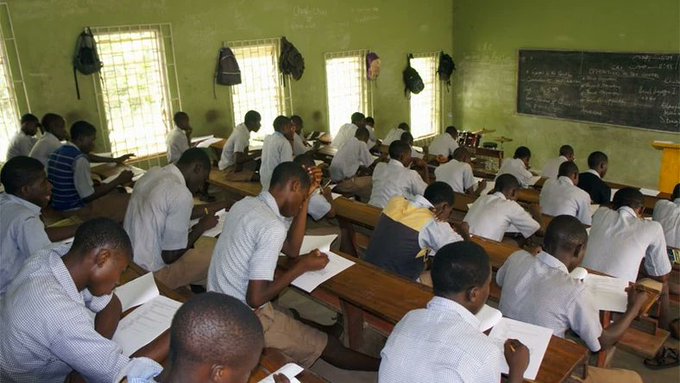
*Schools in Nigeria have been shut for months amid the global coronavirus pandemic, raising concerns over the future of millions of underprivileged children.
Education systems around the world have had to turn to digital and online learning during COVID-19. But as noted by Vice, the most vulnerable children are being cut off from learning completely.
Here’s more from the outlet:
Before the virus had even struck Africa’s most populous country, UNICEF had calculated that 10.5 million Nigerian children aged between five and 14 years old are not in school, while only 61 percent of six to 11 year-olds regularly attend primary school. Nigeria accounts for approximately 20 percent of the total global out-of-school population. The pandemic has made things worse.
The Lagos State Ministry of Education has attempted to address this problem by publicly broadcasting lessons across TV and radio, covering eight subjects: maths, English, physics, chemistry, biology, English Literature, economics and Yoruba. The Commissioner for Education, Folasade Adefisayo, hopes the lessons can be recorded and circulated to as many students as possible.
Some charities have attempted to fill the gap. On the 13th of June, Slum2School Africa, a leading volunteer-driven development organisation announced the launch of its first virtual learning classroom directly targeting underserved students. The goal is to reach 10,000 students.
OTHER NEWS YOU MIGHT HAVE MISSED: Megan Thee Stallion on Getting Shot in BOTH Feet: ‘Worst Experience of My Life’ [VIDEO]
The Nigerian government has approved the reopening of schools for secondary school students in exit classes on August 4, 2020.
SSS 3 students will start writing the West African Senior School Certificate Examination (WASSCE) from August 17, 2020. pic.twitter.com/LrWtzD63uN
— Pulse Nigeria (@PulseNigeria247) July 27, 2020
Meanwhile, according to the report, a significant number of Nigerian cannot afford wifi.
“Thousands of our kids in secondary and primary schools across slums and underserved communities weren’t learning, and many were being engaged in various abusive activities,” says Otto Orondaam, Founder of Slum2School Africa. “So we decided to build the first virtual learning classroom and studio in Nigeria, and also get digital tablets, laptops to thousands of these kids to aid virtual learning. Today 108 kids are learning with their tablets and 840 kids have over 30 community teachers connected through laptops engaging them in cluster learning, but we still have thousands of kids to reach.”
Henry Godwin, a TeachForNigeria Fellow, explained what the government can do to bridge the digital divide that’s pushing out children in underserved communities and rural areas.
“Learning worksheets can be made available to children who are not digitally connected and they can still continue school work through those learning worksheets which are easily understandable,” he says. “There are also low cost tech solutions that can be deployed, and also learning tabs that are solar powered with preinstalled educational videos and content.”
We Publish News 24/7. Don’t Miss A Story. Click HERE to SUBSCRIBE to Our Newsletter Now!





